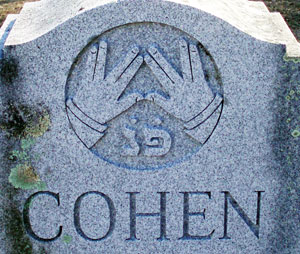Behadrei has the story of someone, a Haredi fellow from Northern Israel, that went to Germany two years ago on a trip to explore his family history. When he went to visit the graves of his ancestors, he discovered an etching on the grave that indicated the man buried was a kohen, of the priestly tribe. The etching was of the hands displayed in the blessing form - a common etching on graves of kohanic families.
Mr Traveler came back from his trip and told his family and showed them the pictures. Everyone was in shock. They had thought they were Levites, because of the name (which we do not know), but now they have discovered they are actually kohanim. The Holocaust interrupted their tradition, and they are only now rediscovering it.
They spent the next two years investigating the family line and history further. They even came across documentation from the town their ancestors were born in and they are listed and registered as kohanim.
They presented the findings to their local rabbi and to the posek Rav Sariel Rosenberg in Bnei Braq. After looking at the issue, both Rav Rosenberg and their local rav have affirmed that they are kohanim and expressed that people should not raise any questions or doubts about their kohanic descent. The male family members now all duchan and take the first aliya of the Torah as full kohanim. In shul this past Shabbos they had the gabbai distribute "chocolate fingers" as a celebration and to symbolize their blessing of the community for the first time with the kohanic blessings.
The shul I grew up in in Chicago had a similar story. When an older fellow got out of Russia and emigrated to Chicago, he was shocked to discover shuls - he remember praying in one as a child, but never since as they had all been shut down. He went to shul regularly after that. In the USA the kohanim only duchen on holidays. When the first holiday arrived (I think it was Pesach but I am not sure), Mr Lapushin saw the duchening and remembered his grandfather doing that. After speaking to the rabbi and undergoing some investigation, he was declared a kohen.
It also reminds me of the old joke of the fellow who wanted to be a kohen. He went to his Orthodox rabbi and asked to be made into a kohen. He offered $10,000, but the rabbi refused. He then went to the local Conservative rabbi who also refused, despite the financial temptation. He then went to the Reform rabbi who accepted the money and declared him a kohen. The Rabbi then asked why he so desperately wanted to be a kohen. The fellow responded, my father was a kohen, my grandfather was a kohen, I have to be a kohen as well!
May the newly rediscovered kohanim bless the Jews faithfully, and may we all discover more about our true heritage.
------------------------------------------------------
Reach thousands of readers with your ad by advertising on Life in Israel
Reach thousands of readers with your ad by advertising on Life in Israel
------------------------------------------------------


Not sure how common this is, but I have a neighbor who had a similar experience.
ReplyDeleteHe was a ba'al Tshuva, his Israeli parents were completely secular. He contacted religious cousins in the States to find out whether his grandfather davened Ashkenaz or Sfard, and if there were any other family minhagim. While speaking to the cousins, they mentioned that the grandfather was a Cohen, and as a result this guy now Duchans every morning - I think that the shul even had a Cohen kiddush for him in shul the first time he duchaned.
I also heard a story the other way - a Russian immigrant was registering to marry a divorcee in Israel. To prove that he was Jewish he brought a photo of his grandparent's grave, and his grandfather had an image of outstretched hands on the tombstone. the Rav asked him if he was a Cohen, the guy had no idea what a Cohen was or whether his father was one.
The Rav decided to investigate further, and asked if he had any witnesses who knew his parents back in Russia who could confirm that they were Jewish. One of the witnesses said that he remembered the grandfather well, he said that the grandfather was very good at fixing things, and everyone called him "The Man with the Golden Hands" - in fact the nickname was so common that they put a picture of hands on the Tombstone.
The Rav laughed out loud when he heard that, and ruled that the man was not a Cohen, and no reason not to marry the divorcee.
Similar story in Toronto. A Baal Teshuva found where his paternal great grandfather was buried, went to visit and saw that picture of a pitcher pf water pouring and that he was a Levi. So the Rav declared him a Levi!
ReplyDeleteBy the way, I remember one fellow (non Cohen or Levi) who used to feel that the Leviim didn't get respect, so whenever the point in the davening was reached for the Cohanim to go out to have their hands washed, he would call out "Cohanim and Leviim!". Another aside, I wonder if there is a connection between the friend verb lave - to wash and Levi! I am a Levi and joke to people that we are called Leviim because we lave the hands of the Cohanim!
interesting stories. thanks
ReplyDeleteand yes, mirskym, I had to look up lave. Dont think I have ever heard it in use.
Kiyor translation "laver" is from lave.
ReplyDeleteLaver is French for to wash.
ReplyDeleteAnd to mirsky, it would be the wordld comes from leviim, not the other way around.
And I presume Latin origins.